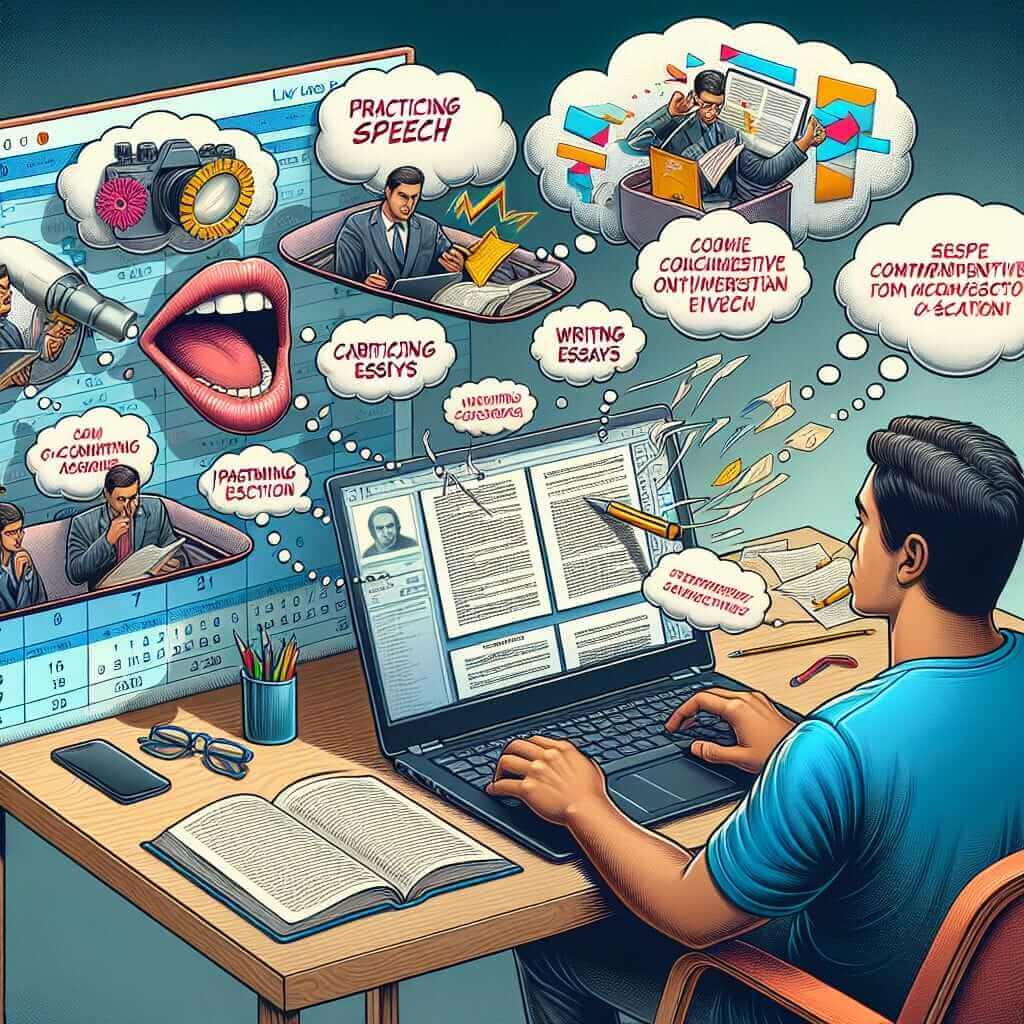The future continuous tense is a versatile tense that can be used in a variety of situations. It is often used to describe actions that will be in progress at a specific time in the future. While it might not be as common as the simple future tense, understanding its nuances can significantly enhance your IELTS writing and speaking scores, demonstrating a strong grasp of English grammar.
Let’s look at a few examples of how the future continuous tense might appear across different sections of the IELTS:
Speaking Part 1:
- “This time next week, I’ll be enjoying the sunny beaches of Bali.” (Here, you use the future continuous to express a future plan for a specific time.)
Writing Task 1 (describing a trend):
- “By 2030, the demand for renewable energy sources will be increasing dramatically.” (This highlights an ongoing trend in the future.)
Writing Task 2 (discussing the future):
- “While technological advancements offer numerous benefits, they will also be creating new challenges for the job market.” (This sentence uses the future continuous to express an ongoing situation with future implications.)
Understanding the Future Continuous Tense
The future continuous tense, also known as the future progressive tense, is used to describe actions or events that will be in progress at a specific point in the future. This tense is formed using the following structure:
Subject + will + be + present participle (-ing form of the verb)
For example:
- “I will be studying for my IELTS exam tomorrow morning.”
- “They will be traveling around Europe next summer.”

Common Uses in IELTS
-
Actions in progress at a specific future time: This is particularly useful in IELTS Speaking Part 1 when discussing future plans.
- “What will you be doing this weekend?” – “I will be visiting my grandparents.”
-
Interrupted future actions: To describe an action that will be interrupted by another action in the future.
- “I will be cooking dinner when you arrive.”
-
Polite inquiries about future plans: The future continuous can sound more polite than the simple future when asking about someone’s plans.
- “Will you be attending the conference next week?”
Applying the Future Continuous Tense in IELTS
Speaking
- Part 1: Use the future continuous to discuss your plans, predictions about the future, or ongoing actions in the future.
- Part 3: This tense can be useful for speculating about future trends or events.
Example: “In the future, I believe more people will be working from home due to technological advancements.”
Writing
- Task 1: When describing future trends in graphs, charts, or diagrams, the future continuous tense can be very effective.
- “As you can see from the graph, the number of students enrolling in online courses will be increasing steadily in the coming years.”
- Task 2: When presenting arguments or discussing future implications, the future continuous can make your writing more dynamic and precise.
Example: “Governments will need to invest in sustainable infrastructure as the global population continues to grow, and resource consumption will be increasing.”
Mastering for Band 8
To achieve a Band 8 in IELTS Writing and Speaking, your use of grammar must be “flexible, accurate, and appropriate.” Here’s how the future continuous can help:
- Variety and Flexibility: Demonstrate a range of grammatical structures. Don’t overuse the future continuous; use it strategically alongside other future tenses (future simple, future perfect) for a sophisticated range. You can read more about the future perfect continuous tense here.
- Accurate Application: Ensure you’re using the tense correctly, paying attention to the form and context.
- Contextual Appropriateness: Choose the most suitable tense depending on what you want to express. For instance, when speculating about future possibilities, consider whether the future continuous truly fits or if a modal verb like “might” or “may” would be more appropriate.
Common Errors and How to Avoid Them
- Incorrect Formation: Be mindful of the correct structure (will + be + present participle).
- Incorrect: “She will working late tomorrow.”
- Correct: “She will be working late tomorrow.”
- Using with Stative Verbs: Avoid using the future continuous tense with stative verbs (verbs that describe states of being or conditions, such as “love,” “believe,” “own”).
- Incorrect: “I will be loving that new movie.”
- Correct: “I will love that new movie.”
- Overuse: While useful, don’t overuse this tense. It’s important to use a variety of grammatical structures in your IELTS writing and speaking to demonstrate your proficiency. Consider if other tenses like the future simple (learn more here) would be a better fit for certain situations.
Conclusion
Mastering the future continuous tense is a valuable asset for any IELTS candidate. By understanding its uses, practicing its application, and being aware of common errors, you can significantly improve the clarity, accuracy, and overall quality of your communication. This, in turn, will enable you to achieve your desired band score and confidently navigate the future, which, after acing the IELTS, looks very bright!